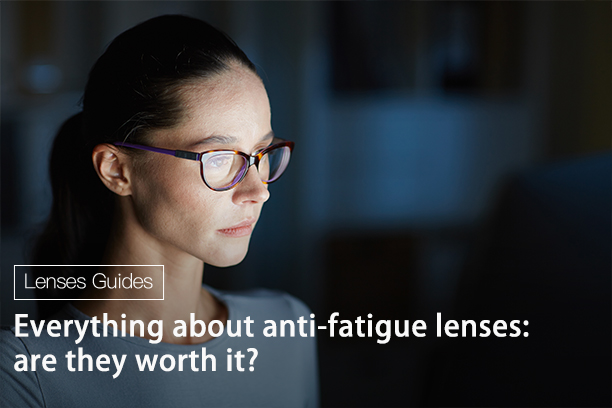- GlassesShop By FrameShop By StyleFeatured












Anti-fatigue lenses, also known as digital or blue light blocking lenses, have gained popularity as a potential solution for reducing eye strain caused by extended screen time and digital device usage.

Anti-fatigue lenses are a specialized type of eyeglass lens designed to reduce eye strain and discomfort associated with extended screen time and digital device usage.
Anti-fatigue lenses have been designed with features to help reduce visual fatigue. Here's how anti-fatigue lenses work to help relieve visual fatigue:
1. Blue light filtering
Blue light is known to contribute to eye strain, disrupt sleep patterns, and cause discomfort. And anti-fatigue lenses can help alleviate some of the visual stress from exposure to blue light.
2. Reduced glare
Anti-fatigue lenses often feature anti-reflective coatings that minimize glare and reflections from screens and ambient lighting. Glare can cause discomfort and make it challenging to see the screen clearly. By reducing glare, these lenses maintain clear vision and reduce visual strain.
3. Enhanced contrast
Some anti-fatigue lenses enhance contrast and improve color perception. This can be particularly useful when viewing digital content with fine details or subtle color variations, reducing the effort required to discern information.
1. Reduced visual fatigue
Anti-fatigue lenses are specifically designed to reduce eye strain and discomfort associated with extended screen time, making them an excellent choice for individuals who work or engage in leisure activities on digital devices.
2. Blue light filtering
They filter out a portion of the blue light emitted by screens, which can help improve visual comfort and reduce the potential for disrupted sleep patterns caused by excessive blue light exposure.
3. Glare reduction
Many anti-fatigue lenses come with anti-reflective coatings that minimize glare and reflections from screens and ambient lighting, ensuring a clearer and more comfortable viewing experience.
4. Enhanced near-vision
These lenses are optimized for close-up tasks, making reading and viewing digital content more comfortable without the need for excessive eye focusing and adjustment.
1. Effectiveness may vary
The effectiveness of anti-fatigue lenses can vary from person to person. Some individuals may experience significant relief from eye strain, while others may not find a substantial difference.
2. Cost
Anti-fatigue lenses are typically more expensive than standard glasses lenses. The added cost is due to the specialized coatings and technologies used to create these lenses.
3. Limited tint options
While some anti-fatigue lenses have subtle tints to reduce glare, they may not offer the same range of tint options as sunglasses. This can be a limitation for individuals who prefer specific tint colors.
1. Office professionals
Professionals who spend long hours working on computers or staring at digital screens may experience eye strain, dry eyes, and discomfort. Anti-fatigue lenses can provide relief and enhance comfort during extended computer use.
2. Students
Students often spend hours on reading, studying or taking online classes in front of digital devices. Anti-fatigue lenses can help reduce the eye strain associated with these activities.
3. Frequent travelers
Travelers who rely on smartphones, tablets, or e-readers for entertainment during long journeys may find anti-fatigue lenses useful for reducing eye fatigue during screen time.
4. Gamers
Video gamers who spend extended periods in front of screens can benefit from the reduced blue light exposure and glare reduction offered by these lenses.
5. Digital professionals
Those in digital professions, such as graphic designers, web developers, and content creators, often work on screens for extended periods. Anti-fatigue lenses can improve their visual comfort and productivity.
6. Those with light sensitivity
Individuals who are sensitive to bright screens or glare may find relief from screen-related discomfort with anti-fatigue lenses.
It's important to note that while anti-fatigue lenses can be beneficial, they work best when combined with other strategies for reducing digital eye strain. These strategies may include taking regular breaks, adjusting screen brightness and settings, and practicing the 20-20-20 rule (taking a 20-second break to look at something 20 feet away every 20 minutes of screen time).

